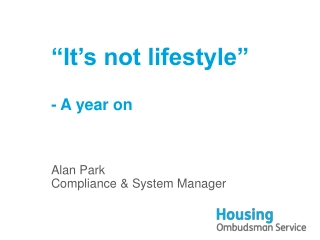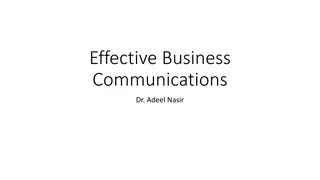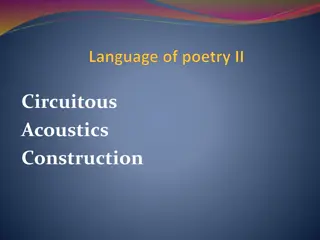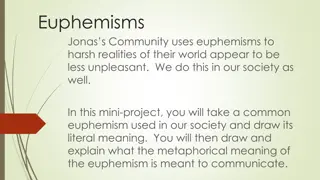Addressing Damp and Mould Issues in Housing Sector: Insights and Recommendations
Change in culture is vital to address damp and mould issues in the housing sector. Recommendations include adopting a zero tolerance culture, focusing on proactive responsibility, treating people fairly, and implementing effective communication strategies. The sector has responded with specialist co
0 views • 24 slides
Retrieval Practice Insights: The Giver and Concepts Explained
In this educational content, retrieval practice questions and answers are provided for lessons focusing on key concepts from "The Giver". Lessons cover topics like science fiction, alternate realities, rituals, euphemisms, utopia, dystopia, and more. Each lesson offers thought-provoking questions an
0 views • 13 slides
Understanding the Power of Language: Influence and Perception
Language is a multifaceted tool that serves various functions, from communication to influencing others. It shapes our worldview through emotive language, rhetorical devices, euphemisms, and dysphemisms. Politicians use euphemisms like "enhanced interrogation" to mask harsh truths. Euphemisms can le
0 views • 16 slides
Mastering Effective Business Communications: Key Concepts and Challenges
Explore the essential concepts of business communications, including denotation, connotations, euphemisms, and perception of reality. Gain insights into the nuances of communication and how misinterpretations can arise. Enhance your understanding of language usage to communicate more effectively in
0 views • 12 slides
Analysis of Various Figures of Speech in African Literature
Explore the use of figures of speech in African literature including innuendo, proverbs, irony, puns, euphemisms, and litotes. These literary devices add depth and layers of meaning to the texts, enhancing the cultural richness of the storytelling tradition in Africa.
0 views • 14 slides
Decoding Common Euphemisms: Literal vs Figurative Meanings
Explore the world of euphemisms by examining common examples used in society. Discover the literal and metaphorical meanings behind euphemisms like "gone to a better place" and "need to powder my nose." Unveil the subtle ways language softens harsh realities through colorful illustrations and explan
0 views • 6 slides
Understanding British Euphemisms and Biblical Wisdom
British people often use subtle language to convey their true feelings, such as saying "quite good" when they actually mean something is disappointing. Alongside this, biblical passages from James provide insights on humility, avoiding gossip, and acknowledging the uncertainty of the future. The mes
0 views • 21 slides






